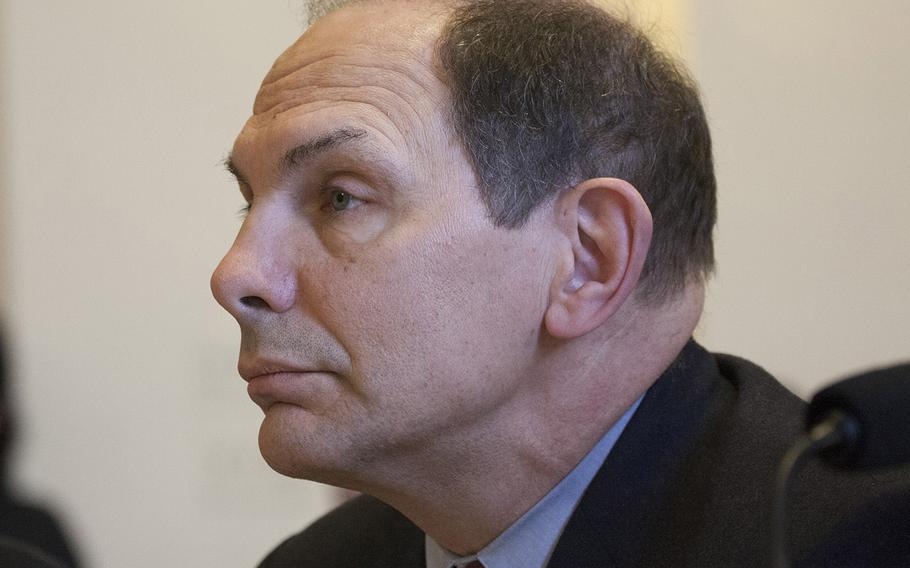
Secretary of Veterans Affairs Bob McDonald listens to the opening statements at a House Veterans' Affairs Committee hearing on Capitol Hill, Feb.10, 2016. (Joe Gromelski/Stars and Stripes)
WASHINGTON — The Department of Veterans Affairs bosses have come up with a new idea on how to punish top executives at the agency – one that would keep control in the hands of VA leadership and exclude involvement of an outside appeals board, VA Secretary Bob McDonald said Wednesday.
The idea was floated by Deputy Secretary Sloan Gibson after suffering a bruising blow from the mandated appeals board that overturned three VA punishments in a row in the past few weeks.
The actions by the Merit Systems Protection Board embarrassed the agency and frustrated Gibson, who said the board had taken away his ability to hold senior executives accountable.
McDonald, appearing Wednesday before the House Veteran’s Affairs Committee to discuss the proposed VA budget for 2017, said Gibson’s idea was to put all senior executives under the regulatory Title 38 statute – the same one used for VA medical professionals -- which would allow the agency to fire executives at will.
“It gives us the ability to pay them more competitively and gives us more flexibility in punishing them,” McDonald said.
He said Gibson introduced the idea during a meeting Tuesday between the VA leadership and the House and Senate oversight committee leaders.
The announcement marked the first time that the lawmakers and VA officials appeared to agree on accountability issues at an agency that has been plagued by scandal. For nearly two years, lawmakers on the oversight committees have been critical of VA leadership for failing to take executives to task, after details emerged of huge appointment and benefits wait times and of cover-ups that left veterans dying while languishing on hidden wait lists.
Rep. Jeff Miller, R-Fla, chairman the House Veterans’ Affairs Committee, has been pressing VA leaders to agree to legislative reform of the civil service system that would allow for greater accountability. Until now, McDonald and Gibson have said they had the tools they needed.
Miller reiterated his concerns Tuesday, saying he would be remiss if he didn’t mention the frustrations he and other members of the panel felt following the MSPB reversals.
“We’ve got to have an honest conversation about what’s happening in the civil service system,” he said.
Other groups also railed against the system after the MSPB rulings. Last week, the board reversed the VA’s attempt to fire Linda Weiss, the director of the Albany Stratton VAMC following revelations of mismanagement of patient care. That reversal came on the heels of earlier decisions by the board to undo disciplinary actions in high-profile cases against executives Diana Rubens and Kimberly Graves, for their actions involving their reassignments to different positions while collecting hundreds of thousands of dollars in relocation incentives.
Gibson vowed last week that despite the board’s reversal, he would not return Weiss to any position where she would be responsible for patient care.
American Legion National Commander Dale Barnett issued a statement Tuesday, saying it was impossible to restore accountability to the VA when the board kept reversing its attempts to punish poor performers.
“By tolerating bad behavior without even allowing a slap on the wrist, the MSPB is risking the lives of veterans,” Barnett said. “The American Legion is calling on Congress, the Department of Veterans Affairs and the MSPB to work together to reform the procedures needed to finally bring accountability to a department that desperately needs it.”
Gibson’s proposal will be incorporated into negotiations between the House and Senate oversight committees over a package of veteran’s legislation that will go up for a vote later this year. The proposal could face some resistance, particularly from Sen. Bernie Sanders, D-Mass., who was instrumental in ensuring that the appeals board had the final say on disciplinary cases against VA executives when the legislation was passed last year.
McDonald also outlined other issues he hopes Congress will consider for legislation this year, including 40 new proposals. Among them: allowing McDonald the authority to transfer up to 2 percent of discretionary funding across accounts; allowing for greater flexibility in job hours and pay for top medical staff so the VA can be more competitive in hiring, and restructuring the current process for benefits appeals, in which some cases have taken years or even decades to resolve.
McDonald said he believed by restructuring the appeals process rather than just adding more staffing, the VA could ultimately cut the number of staff and expenditure while streamlining process and ending the backlog.
“If we are serious about changing the VA and better serving veterans, we can’t keep kicking the can down the road,” McDonald said.
Miller welcomed the proposal.
During two hours of testimony, McDonald faced down what has become routine criticism about accountability issues in other areas as well.
Rep. Doug Lamborn, R-CO, grilled McDonald on why nobody was punished after an inspector general report last year found long wait times at the VA in Colorado Springs.
McDonald said the report found bad training, not intentional malfeasance, and the VA has addressed the issue.
Lamborn wasn’t appeased.
“Whether it was malicious or not, I think the records were falsified and someone needs to be fired,” he said.
Rep. Mike Coffman, another Republican from Colorado, picked up the mantle, pressing McDonald on why the VA wouldn’t get behind a legislative effort that would enable them to take back bonuses from executives who were found to have acted badly to get the money and why the VA wasn’t getting rid of more executives who’d been found guilty of wrongdoing.
Coffman assailed McDonald for “saying great things” but “not attacking the heart of the problem” and allowing bad behavior to continue.
“You can’t fire your way to excellence,” McDonald said.
“It might be a good start,” Coffman replied.
cahn.dianna@stripes.com Twitter: @DiannaCahn